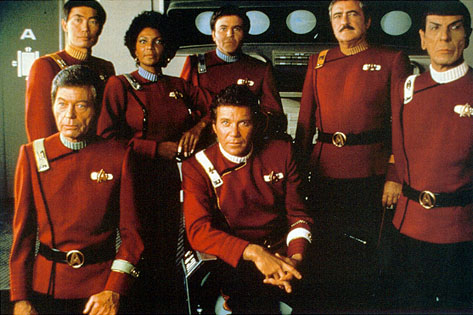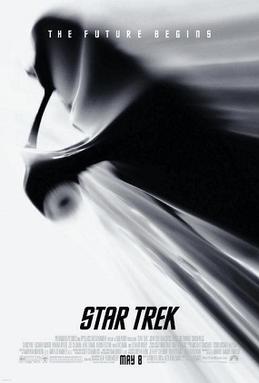 Eric Bana, Zoe Saldaña, Zachary Quinto and Chris Pine in JJ Abram's Star Trek (2009)
Eric Bana, Zoe Saldaña, Zachary Quinto and Chris Pine in JJ Abram's Star Trek (2009)Let me begin by saying I am not a Star Trek fan. That doesn't mean I don't love it, but only for the reasons any true trekkie would regard as haughty sneering. I don't sneer, I snort. Say what you like about the preachy dialogue, the hammy acting, the made-up science and the unfathomable technobabble - not to mention the pervading sixties' retro-futuristic feel of the entire production - the entertainment factor, sometimes precisely because of the aforementioned, is so strong it is hard not to like the show.
 I also love the films, which take the basic premise of the original series and sustain a story arc over the course of five individual instalments. I am, of course, referring to The Wrath of Khan, The Search for Spock, The Voyage Home, The Final Frontier, and The Undiscovered Country. I have even recently begun to re-watch the whole saga, which, if you agree to look at from a critical viewpoint, provides some very interesting exploration of such universal themes as friendship, courage, selflessness, revenge, the human relationship with God, aging, and facing our own mortality. It was because of this, and the sheer prospect of watching Chris "you could lick him all over" Pine and Zachary "Sylar, the hottest villain of them all, from Heroes" Quinto camp it up in tight-fitting brightly coloured shirts while still trying to maintain their macho dignity. Also, Leonard Nimoy had agreed to return.
I also love the films, which take the basic premise of the original series and sustain a story arc over the course of five individual instalments. I am, of course, referring to The Wrath of Khan, The Search for Spock, The Voyage Home, The Final Frontier, and The Undiscovered Country. I have even recently begun to re-watch the whole saga, which, if you agree to look at from a critical viewpoint, provides some very interesting exploration of such universal themes as friendship, courage, selflessness, revenge, the human relationship with God, aging, and facing our own mortality. It was because of this, and the sheer prospect of watching Chris "you could lick him all over" Pine and Zachary "Sylar, the hottest villain of them all, from Heroes" Quinto camp it up in tight-fitting brightly coloured shirts while still trying to maintain their macho dignity. Also, Leonard Nimoy had agreed to return. Despite what the hardcore fans are saying, which I will return to, this film is great! What it does is offer the viewers much more than a speculation of the early years of the crew of the Enterprise and its "five-year mission to boldly go where no man has gone before". It effectively retcons the entire history of the prgramme, creating an alternative history, and allowing the franchise to be reactivated for a modern audience. Of course, the basic elements are there: Starfleet in the 23rd century; gut-feeling, "I don't believe in no-win situations", Kobayashi Maru-cheating Captain Kirk; quiet, pensive, half-Human half-Vulcan conflicted Spock; gruff, grumpy, "I'm a doctor, not a [insert other profession here]" Doctor McCoy; various races and species all working together acting as an intergalactic United Nations; and a truly ludicrous plot. There are also some interesting changes. Most scandalous (in the trekkie community) is the destruction of the planet Vulcan, and the heavy reduction of the Vulcan population. Spock and Uhura's romance is also briefly touched on, which undoubtedly must have had hardcore Trek fans squirming in their seats.
Despite what the hardcore fans are saying, which I will return to, this film is great! What it does is offer the viewers much more than a speculation of the early years of the crew of the Enterprise and its "five-year mission to boldly go where no man has gone before". It effectively retcons the entire history of the prgramme, creating an alternative history, and allowing the franchise to be reactivated for a modern audience. Of course, the basic elements are there: Starfleet in the 23rd century; gut-feeling, "I don't believe in no-win situations", Kobayashi Maru-cheating Captain Kirk; quiet, pensive, half-Human half-Vulcan conflicted Spock; gruff, grumpy, "I'm a doctor, not a [insert other profession here]" Doctor McCoy; various races and species all working together acting as an intergalactic United Nations; and a truly ludicrous plot. There are also some interesting changes. Most scandalous (in the trekkie community) is the destruction of the planet Vulcan, and the heavy reduction of the Vulcan population. Spock and Uhura's romance is also briefly touched on, which undoubtedly must have had hardcore Trek fans squirming in their seats.However, the explanation for such sacrilege is there and openly offered by the characters: this is an alternate history! No Star Trek fan has a leg to stand on, considering that any perceived perversion of history is explained by the plot. There are no contradictions with "established" Star Trek history, since this is another history. Also, it's not real!
 On to the film, proper. The effects are first rate. Watching in an obscure cinema in the centre of Madrid, I genuinely forgot about my surroundings and was immediately pulled into the world of the film. Only one moment led me to cross my brow and whisper to my friend: at one point, three characters jump down from space, enter the planet's atmosphere, pull their parachutes and land on a drilling device several thousand feet above the surface. I can only assume that a society with the technology enabling man to travel faster than the speed of light is also capable of creating spacesuits able to withstand such a freefall - and why did they fall from space, anyway? There is no air, surely? Apart from that - and the fact that Kirk was a little more ruthless with the villain's fate than Shatner's character would have been - I didn't question the spectacle.
On to the film, proper. The effects are first rate. Watching in an obscure cinema in the centre of Madrid, I genuinely forgot about my surroundings and was immediately pulled into the world of the film. Only one moment led me to cross my brow and whisper to my friend: at one point, three characters jump down from space, enter the planet's atmosphere, pull their parachutes and land on a drilling device several thousand feet above the surface. I can only assume that a society with the technology enabling man to travel faster than the speed of light is also capable of creating spacesuits able to withstand such a freefall - and why did they fall from space, anyway? There is no air, surely? Apart from that - and the fact that Kirk was a little more ruthless with the villain's fate than Shatner's character would have been - I didn't question the spectacle. Acting-wise, each member of the cast found a good balance between the recogniseable mannerisms and speech-patterns of the original cast, with the ability to add their own touches to their portrayals. I felt Zoe Saldaña, John Cho and Anton Yelchin, as Uhura, Sulu and Chekhov respectively, were the most (ahem) liberal interpretations, but their roles in the main story were so marginalised, they should be excused for their desire to define themselves within the film. Chris Pine was dashingly attractive - and surprisingly accurate - capturing Kirk's swashbuckling, hands-on, arrogant approach to comand, while Zachary Quinto was undoubtedly the star of the piece. Arguably the biggest name actor after Leonard Nimoy - playing "Spock Prime" - and Eric Bana, Quinto effortlessly created a multi-layered, at times tortured, Spock with whom I'm sure every memeber of the audience could either identify or feel sympathy for. Words cannot describe the glow I felt watching Quinto and Nimoy chinwag in that oh-so-Spock-like way in a short scene towards the end of the film. The supporting cast was also equally impressive: Bruce Greenwood made a commanding (obviusly) Captain Pike, acting as Kirk's mentor and fleshing out a rarely explored tidbit of Star Trek mythology; Ben Cross authoritatively transmitted the patient thoughtful Sarek, Spock's Vulcan father; while everybody's favourite shoplifter Winona Ryder gave an interestly - and sadly brief - turn as Amanda Grayson, Spock's mother. Even Simon Pegg - playing a practical homage to James Doohan's Scotty - and Eric Bana were good, the latter almost unrecogniseable playing vengeful Romulan miner Captain Nero.
Acting-wise, each member of the cast found a good balance between the recogniseable mannerisms and speech-patterns of the original cast, with the ability to add their own touches to their portrayals. I felt Zoe Saldaña, John Cho and Anton Yelchin, as Uhura, Sulu and Chekhov respectively, were the most (ahem) liberal interpretations, but their roles in the main story were so marginalised, they should be excused for their desire to define themselves within the film. Chris Pine was dashingly attractive - and surprisingly accurate - capturing Kirk's swashbuckling, hands-on, arrogant approach to comand, while Zachary Quinto was undoubtedly the star of the piece. Arguably the biggest name actor after Leonard Nimoy - playing "Spock Prime" - and Eric Bana, Quinto effortlessly created a multi-layered, at times tortured, Spock with whom I'm sure every memeber of the audience could either identify or feel sympathy for. Words cannot describe the glow I felt watching Quinto and Nimoy chinwag in that oh-so-Spock-like way in a short scene towards the end of the film. The supporting cast was also equally impressive: Bruce Greenwood made a commanding (obviusly) Captain Pike, acting as Kirk's mentor and fleshing out a rarely explored tidbit of Star Trek mythology; Ben Cross authoritatively transmitted the patient thoughtful Sarek, Spock's Vulcan father; while everybody's favourite shoplifter Winona Ryder gave an interestly - and sadly brief - turn as Amanda Grayson, Spock's mother. Even Simon Pegg - playing a practical homage to James Doohan's Scotty - and Eric Bana were good, the latter almost unrecogniseable playing vengeful Romulan miner Captain Nero.The problem - and yet often highly-amusing element - with the original run of Star Trek, and especially with the remaining spin-off series, is that it took itself far too seriously, attempting to transmit a highly American image of universal harmony through a mixture of hippie-ideology and Western political-structure and foreign policy. The films focused much more on the relationship between the characters, using all of the "message" as a backdrop to the story, which ironically served to underline the importance of all of the intentions of franchise creator Gene Roddenberry. What JJ Abrams has managed to do with this year's instalment is redefine all of this, with an updated version which - despite the protestations of the hardcore fans - reaffirms the original remit of the programme.
Four Stars.

PS: Did I mention most of the male cast is hot...?








A really nice review and yes I am old school Star Trek. Spock and Kirk were like my surrogate parents when I was growing up so changing the timeline and thus throwing out the previous arc was a bit of a shock, but it made for a hell of a lot of sense. But can you tell me how on earth did Madea get a role in this movie with her/his no acting self? Now that was just too much imagination to stretch.
ReplyDeleteAin't nothing like old school Trek! I actually had to research this Madeacharacter. S/he hasn't reached European shores, fortunately...
ReplyDelete